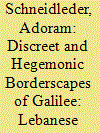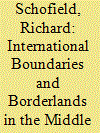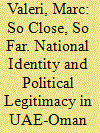|
|
|
Sort Order |
|
|
|
Items / Page
|
|
|
|
|
|
|
| Srl | Item |
| 1 |
ID:
162258


|
|
|
|
|
| Summary/Abstract |
The Iraqi claims on and invasion of Kuwait have focused most of the scholarly attention on the drawing and defining of the Kuwaiti border. Issues of material delineation between the two countries have mattered a great deal for asserting sovereignty, but also for the exploration of oil and access to Gulf deep waters. Yet, the identity dimensions of the Kuwaiti border have often been overlooked. Building on the literature that sees more to the border than just a dividing line but seeks to include individual and collective narrative and experiences of borders, this article proposes to investigate the social–cultural perception of the Kuwaiti border and explores the complex connection between border and identities in the Kuwaiti case. Borders, it has been argued, have often played a significant role in identity building processes. Yet in the case of Kuwait where the border, contested by powerful neighbours, cuts across empty desert and tribal territories, the border seems to have played a limited one in shaping the national identity. This article investigates the interplay between the bordering process asserting sovereignty, on the one hand and the notions of identity and sense of belonging, on the other, resulting from a complex mix of socio-cultural legacies inherited from the pre-national period (the hadhar/badû dichotomy) and processes of ordering and othering enacted by the state and its welfare policies. Based on the analysis of the spatial imaginary as constructed by the Nationality Law of 1959, it argues that the urban core of the port-city or the interaction with it have remained the main benchmark of Kuwaiti identity, while the desert periphery has been imagined as culturally distinct and economically backward in the oil era – a representation that nevertheless provides a reservoir of symbols and narratives ready to be reimagined or appropriated.
|
|
|
|
|
|
|
|
|
|
|
|
|
|
|
|
| 2 |
ID:
162259


|
|
|
|
|
| Summary/Abstract |
Following the processual shift in border studies, recent concepts such as “borderities” and “borderscapes” allow for original analyses that give voice to multiple agents alongside that of the nation-state in bordering processes, elucidate the links between border representation and border experience, and establish borders as both “markers of belonging and places of becoming”. This article will explore the potentials of these concepts when applied, not to the highly mediatised Separation Fence in the West Bank, but to a less studied border that reveals parallel evolutions in Israeli borderities and contemporary Middle Eastern borderscapes: the Israel-Lebanon border. It will focus on a marginal and little known phenomenon, that of the migration of Southern Lebanese to Israel. The creation of the State of Israel at the expense of Pan-Arab and Palestinian national aspirations has laid the foundations for a diversified relation to this border amongst inhabitants of the Galilee today depending notably on their belonging to the indigenous Arab population, or the more recently settled Jewish population. Through an analysis of two groups of Lebanese migrants, who, although originating from the same villages in Lebanon, settled respectively on opposite sides of the Arab/Jewish divide in Galilee, we will see how different patterns of border crossings produce different levels of interiorisation of the Israel-Lebanon border and different uses of categories of identity and meaning defined by it. Reterritorialised in either of Galilee’s superimposed geographies, Southern Lebanese migrants reveal two alternative Galilean borderscapes, one normative and hegemonic, partaking in the “national order of things”, the other discreet and alternative.
|
|
|
|
|
|
|
|
|
|
|
|
|
|
|
|
| 3 |
ID:
162266


|
|
|
|
|
| Summary/Abstract |
The human control of fire is a relatively neglected part of the discussion of the contemporary transformation of the planet. Thinking about it in terms of geopolitics is a way to link climate adaptation, extinction and the possibilities of extending traditional analyses of political ecology to the global scale. Such thinking is explicitly rejected as the appropriate premises for foreign policy action by the Trump administration which poses American greatness in terms of traditional understandings of firepower. This clash of geopolitical cultures is now key to global politics, where dramatic landscape transformation, related species extinctions as well as climate change results directly and indirectly from human control of combustion. Firepower is a matter of military technology as well as, in the form of fossil fuel combustion, the essential energy source that fuels the global economy. Focusing on combustion as a key geophysical force in contemporary geopolitics offers useful insights into the Anthropocene discussion and, in particular, the two planetary boundaries of climate change and biodiversity loss, which are key to contemporary efforts at global environmental governance.
|
|
|
|
|
|
|
|
|
|
|
|
|
|
|
|
| 4 |
ID:
162265


|
|
|
|
|
| Summary/Abstract |
Through an historical analysis, this article discusses outward investments promotion as an underexplored aspect of geoeconomics. The empirical focus is on Italy’s institutional support to the internationalization of firms from 1992 to 2015, between the post-socialist transformation of Central and Eastern Europe and the years following the global crisis of 2008. The main argument is that large geopolitical events led to complex interactions between Italy’s firms and policymakers. These interactions reshaped Italy’s geo-economic strategies as well as territorialities. The article identifies the emergence and consolidation of a group of public, semi-public and private actors, thus building a new model of an investment promotion community (IPC). It finds that (a) the IPC emerged to provide an institutional infrastructure necessary to project Italy’s sovereignty beyond national boundaries and (b) in so doing, the elites involved interpreted firms’ needs within broader political issues. Thus, the emergence of the IPC represents a shift from geopolitics to geoeconomics.
|
|
|
|
|
|
|
|
|
|
|
|
|
|
|
|
| 5 |
ID:
162261


|
|
|
|
|
| Summary/Abstract |
Renewed academic interest in the Middle Eastern border is inevitable with the marked increase in fortified territorial limits across the region and the appearance of new borderland spatialities in the sovereign margins of the war-torn Iraqi, Syrian and Yemeni states. If the consequent spectacle of displaced populations confronting state power at the international boundary seems a defining image, this article concentrates on two other dominant, less publicised but still relevant border representations from the recent past: territorial definition and its deterministic association with conflict in the northern Gulf and the resource-driven finalisation of the peninsula’s territorial framework. This follows consideration of the significance of the borderland in the region. The author reflects back here on a long record of research into these issues and argues that all of these contexts must be acknowledged in any balanced appraisal of the Middle Eastern border. The article comments on the challenge of extending regional approaches to the study of borders and – on the centenary of the infamous 1916 Sykes-Picot treaty – acknowledges that the Middle East region’s experience of international boundaries continues to be depicted as exceptional. Unsurprisingly, it will conclude that there is no one typical Middle Eastern border.
|
|
|
|
|
|
|
|
|
|
|
|
|
|
|
|
| 6 |
ID:
162262


|
|
|
|
|
| Summary/Abstract |
Renewed academic interest in the Middle Eastern border is inevitable with the marked increase in fortified territorial limits across the region and the appearance of new borderland spatialities in the sovereign margins of the war-torn Iraqi, Syrian and Yemeni states. If the consequent spectacle of displaced populations confronting state power at the international boundary seems a defining image, this article concentrates on two other dominant, less publicised but still relevant border representations from the recent past: territorial definition and its deterministic association with conflict in the northern Gulf and the resource-driven finalisation of the peninsula’s territorial framework. This follows consideration of the significance of the borderland in the region. The author reflects back here on a long record of research into these issues and argues that all of these contexts must be acknowledged in any balanced appraisal of the Middle Eastern border. The article comments on the challenge of extending regional approaches to the study of borders and – on the centenary of the infamous 1916 Sykes-Picot treaty – acknowledges that the Middle East region’s experience of international boundaries continues to be depicted as exceptional. Unsurprisingly, it will conclude that there is no one typical Middle Eastern border.
|
|
|
|
|
|
|
|
|
|
|
|
|
|
|
|
| 7 |
ID:
162264


|
|
|
|
|
| Summary/Abstract |
The United States Information Agency (USIA) has received little sustained scrutiny from critical military geographers, despite the major role it played in waging the Cold War. This article outlines the USIA’s role in waging psychological war in support of the US mission in Vietnam, notably its establishment in 1965 of the Joint United States Public Affairs Office (JUSPAO). Through an analysis of USIA operations, this article argues that psychological war can be understood as a governmental strategy to exert power over the people and territory of Vietnam. Through an examination of problems related to evaluating and conducting research for psychological war, this article questions the extent to which the United States succeeded in establishing this power, concluding that the effects of psychological war in Vietnam were, at best, inconclusive, and offer little evidence to support contemporary strategies to ‘win hearts and minds’.
|
|
|
|
|
|
|
|
|
|
|
|
|
|
|
|
| 8 |
ID:
162263


|
|
|
|
|
| Summary/Abstract |
This article analyses the search and rescue (SAR) activities carried out by three NGOs (MOAS, MSF and Sea-Watch) in the Central Mediterranean, and asks whether and in how far non-governmental SAR contributes to the repoliticization of the EU maritime border. The article first introduces the concept of depoliticization/repoliticization, as well as that of humanitarianization. Two sections summarize the development of the SAR regime and the governmentalization of international waters in the Strait of Sicily from the Cap Anamur case to 2016, and from late 2016 to recent days. Against this backdrop, the article analyses the different political positions taken by MOAS, MSF and Sea-Watch, their operational activities, as well as their cooperation and relations with the other actors involved in SAR. The three NGOs react differently to the contradictions that are typical of humanitarian non-state action. MOAS keeps a neutral political profile, whereas MSF and Sea-Watch regard their SAR activities as part of a political, not only humanitarian commitment. While the convergence of delocalized state sovereignty and humanitarian reason leaves hardly any room for manoeuvre, MSF and Sea-Watch try to question and contrast governmental policies and practices, as well as to turn international waters into a political stage from which they can make their voice heard and on which they can play the watchdog role.
|
|
|
|
|
|
|
|
|
|
|
|
|
|
|
|
| 9 |
ID:
162260


|
|
|
|
|
| Summary/Abstract |
Since the accession of Oman and the United Arab Emirates to the independence in the early 1970s, the building of both a state apparatus and a nation has lain at the heart of the political projects of respective rulers of these countries to assert their legitimacy and control over their respective territory. This issue of the mutual relationship has been particularly crucial, given the two countries’ shared modern history, and the tribal and ethnic proximity between inhabitants living across the new international boundary. The study of the two border towns of al-Ayn (United Arab Emirates) and al-Buraymi (Oman) provides a unique window onto unfolding patterns of the construction of political sovereignty in post-colonial states and the link between the building of national identity and the physical demarcation from the (br)other.
|
|
|
|
|
|
|
|
|
|
|
|
|
|
|
|
| 10 |
ID:
162256


|
|
|
|
|
| Summary/Abstract |
At the end of June 2014, Abu Baqr al-Baghdadi, the leader of what was to become Da’ish or the Islamic State, announced at the main mosque in Mosul the creation of an ‘Islamic caliphate’ with himself as caliph. With its creation, he announced, the division of the Middle East, forced upon the region by the 1916 Sykes–Picot agreement, was ended, to be replaced by a territorially limitless caliphate for all Muslims. Despite the obvious political rhetoric that the announcement involved, al-Baghdadi’s aspirations raised interesting questions of historical and legal interpretation. Quite apart from what the Sykes–Picot agreement actually established, to what extent, for instance, is there an innate contradiction between visions of state and boundary in international law and the Islamic concept of the caliphate? How have those concepts evolved over the past century and how inimical are contemporary views of ‘the caliphate’ to established principles of territorial delimitation? And, to what extent do the actual territorial delimitations of Middle Eastern states reflect pre-colonial patterns of spatial division rather than simply the consequences of colonial imposition? How distinct, in short, are the apparently opposed concepts of state and caliphate in the contemporary world? This article will attempt to show that the points of similarity between them are probably far greater than is usually recognised.
|
|
|
|
|
|
|
|
|
|
|
|
|
|
|
|
| 11 |
ID:
162257


|
|
|
|
|
| Summary/Abstract |
Jordan is a country of contrasts. Few people can boast of being a hundred percent rooted within the boundaries of the actual Kingdom. Almost everyone has relatives across several borders. The aim of this article is to explore the extent to which tribalism in Jordan acts as an identity source or the extent to which it is politicized and instrumentalized to protect economic and social benefits. My literature framework is the instrumentalist theory of ethnicity and the border studies literature. The extent to which ethnicity guarantees a return to the people determines people’s adherence to it. Some scholars regard ethnicity as a tool of political mobilization because ethnic groups could be considered also as interest groups. This theory provides an explanation of tribal behavior regarding the role of identity. As an example, I describe how East Bankers have reacted to challenges from the Palestinian population since 1948. In particular, the present-day delicate equilibrium among East Bankers and Palestinians is deeply decisive in regard to the Jordanian response to the regional crisis.
|
|
|
|
|
|
|
|
|
|
|
|
|
|
|
|
|
|
|
|
|